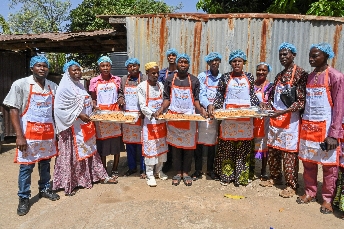Nigeria’s efforts to incorporate High-Quality Cassava Flour (HQCF) into breadmaking have gained momentum with the recent training of trainers in the South West region.
This initiative aims to enhance cassava utilization and strengthen the cassava value chain by equipping processors with skills to produce bread and confectioneries using a 20:80 blend of HQCF and wheat flour.
From 200 trained processors, 10 were selected for advanced training as lead trainers. These lead trainers are now poised to transfer their knowledge to others, promoting the widespread adoption of this innovative technology.
The training, conducted at Quality Bakery in Abuja by the Association of Master Bakers and Caterers of Nigeria (AMBCN), FCT Abuja Chapter, included participants from Oyo State project clusters, as well as representatives from Pacific Ring West Africa (PRWA)/GIZ and the African Agricultural Technology Foundation (AATF).
This effort is part of the “Mechanization of Cassava Production and Processing in Nigeria” project, led by AATF and funded by the German Federal Ministry for Economic Cooperation and Development (BMZ) under the Fund for the Promotion of Innovation in Agriculture (i4Ag).
The project is implemented by Deutsche Gesellschaft für Internationale Zusammenarbeit (GIZ) GmbH in collaboration with AATF, Agridrive Ltd., and Clayuca Corporation.
The project seeks to tackle major challenges faced by cassava farmers, including low yields, high post-harvest losses, and limited access to modern processing technologies.
By introducing mechanization, digital tools, and best agronomic practices (GAP), it aims to boost efficiency, increase incomes, and unlock the full potential of Nigeria’s cassava value chain.
A robust capacity-building program is a cornerstone of the initiative, targeting 6,000 cassava farmers and 1,000 processors. In 2024, 1,000 farmers and 200 processors were trained in Oyo State. Plans for 2025 include training 2,000 farmers (1,000 each in Oyo and Ogun States) and 300 processors (200 in Ogun and 100 in Oyo). The program will conclude in 2026 with the training of 3,000 farmers and 500 processors, ensuring a lasting impact across the region.
This revitalized push highlights Nigeria’s dedication to agricultural innovation, leveraging cassava as a vital tool for food security and economic growth.


